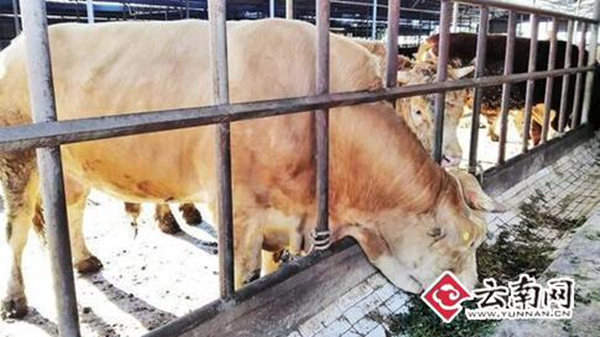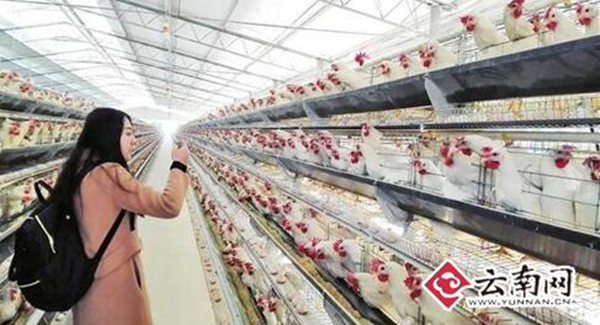Industrial Development Models to Lift SW China Counties Out of Poverty
GPIG by Cheng Yahui, March 1, 2017 Adjust font size:
Model 3: Mutual Help between Enterprises and Households in Need
Party workers in many counties in Dali have also adopted the method of building connections between enterprises which need finance and destitute rural families who have received anti-poverty funds of 50,000 yuan (U.S. $7,284).
Xingrong Husbandry in Weishan County attracted a total investment of 6 million yuan (U.S. $874,062) from 120 households, and is contracted to give each of the investors an annual return of 5,000 yuan (U.S. $728) over a span of five years. Alternatively, the stakeholders can choose to pay another 3,000 yuan (U.S. $437) and receive a cow worth 8,000 yuan (U.S. $1,165). The company will send professionals to help them build their own cattle breeding business. More than 300 families have now joined the program.

The cattle farm of Xingrong Husbandry Co., Ltd. [yunnan.cn]
Another enterprise in Weishan, Jianhong Trading, received individual investments of 50,000 yuan (U.S. $7,284) from 1,052 families spread over 24 villages last year. By the end of 2016, these households had shared dividends of 5.74 million yuan (U.S. $836,186) and the 24 villagers’ committees saw their collective revenues increase by a total of 480,000 yuan (U.S. $69,925).
Currently, the company has 328 full-time workers and hires 12,000 casual laborers each year. It plans to build a large-scale organic fertilizer factory, which, coupled with a chicken farm, will produce 13,000 jobs and benefit more than 3,000 rural families.

The chicken farm of Jianhong Trading Co., Ltd. [yunnan.cn]
Yunnan Dali Erbao Foods in Eryuan County obtained investments totaling 5 million yuan (U.S. $728,400) from 100 poor families, and has paid each of the investors a return of 4,000 yuan (U.S. $583) in the first year.
Zhang Shouhua, who has worked with the company for ten years, makes 2,500 yuan (U.S. $364) a month. “I used to earn very little from farming,” she says. “Now my income is much higher and my life is much better. Working here, I can earn my living and take care of my family at the same time.”
Dali Pinhong Plateau Agricultural Technology Development, also in Eryuan, pledges to give 100 households an annual dividend amounting to 8.5 percent of their investment. Its manager has also committed to give preferential treatment to the local poor in purchasing their produce and in recruiting labor. Additionally, the company has allocated 550,000 yuan (U.S.$80,122) this year to give each disadvantaged family a payment of 1,000 yuan (U.S.$146),directed to help their development.
In Xiangyun County, 21 enterprises are engaged in assisting 21 destitute villages. Cao Shengzu, Party chief of one of the companies, Longyun Foods, explains that the organization attracted investments totaling 40 million yuan (U.S. $5.83 million) from 800 families to promote its own development. In return, it has pledged to give each of the investors a yearly dividend of 3,000 yuan (U.S. $437) over three years.
Across 12 counties in Dali there are a total of 316 enterprises involved in the mutual assistance program, along with 300poor local households, notes Shi Yubing, director of the prefecture’s Poverty Alleviation Office. The companies have attracted 534 million yuan (U.S. $77.8 million) in investments from 16,986 families, while bringing increased incomes to 26,682 households in return and directing 34.33 million yuan (U.S. $5 million) to the development of the villagers. By the end of 2016, the investing households had received dividends totaling 59.19 million yuan (U.S. $8.6 million), averaging out at 3,484 yuan (U.S. $508) per family.